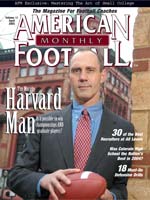AMERICAN FOOTBALL MONTHLY THE #1 RESOURCE FOR FOOTBALL COACHES
Article CategoriesAFM Magazine
|
Mastering the Recruiting Process at the Small College Levelby: Tony Johnson© More from this issue At the NAIA level, recruiting student athletes takes on so much more than just a high school visit and a few recruiting weekends. We are not blessed in so many cases to just show up with our school names on our shirts and have recruits begging to come to our schools. We have to be more creative through phone calls and mail flow. For us at Bethany College, we are very fortunate to have a lot of tradition based on what the previous Head Coach, Ted Kessinger, did here in his twenty-eight years. We are blessed to have a summer full-contact camp that allows many of the top players in the state to come to Bethany and show their skills. We have seen a lot of Division I-A, I-AA, and II talent, as well as NAIA/D-III athletes. The camp gets over 300 young men on our campus every summer. For Bethany, thi....The full article can only be seen by subscribers. Subscribe today!
|
|
|||||||
| HOME |
MAGAZINE |
SUBSCRIBE | ONLINE COLUMNISTS | COACHING VIDEOS |
Copyright 2025, AmericanFootballMonthly.com
All Rights Reserved





